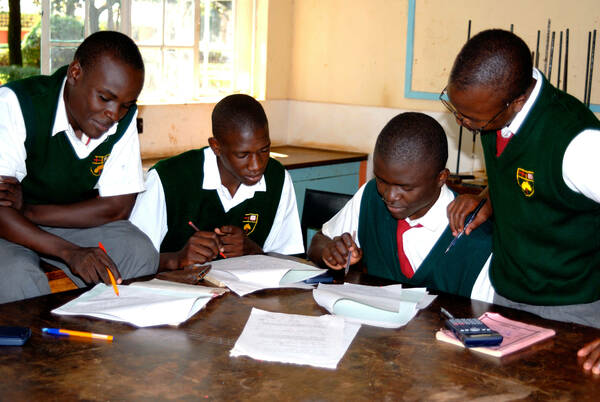
Kenya’s 2013 Basic Education Act expanded the number of national schools and increased student body diversity quotas based on the act’s guiding principles: the “promotion of peace, integration, cohesion, tolerance, and inclusion,” and the fostering of “the spirit and sense of patriotism, nationhood, unity of purpose, togetherness, and respect.” This change in the policy made it possible for researchers with the Ford Program in Human Development and Solidarity at the Kellogg Institute for International Studies to explore the effects of increased student body diversity on selected principles of trust and tolerance.
What they found? Increased ethnic diversity in these schools is making a difference.
“Students in these national schools have more inter-ethnic and inter-religious friendships, and these friendships contribute to a more tolerant, trusting student body which prioritizes a national identity,” says principal investigator Jaimie Bleck, associate professor of political science and senior research advisor for the Ford Program.
The research project, “Can Student Body Diversity Foster Inter-ethnic Trust, Tolerance, and Patriotism? The Role of Friendship in Kenya,” found that national school attendance, through the mediating factor of inter-group friendships, does lead to higher levels of tolerance and self-reported trust of other religious and ethnic groups and a stronger sense of national identity versus local identity. Students in national schools have more diverse friendships compared with students in comparison schools (a difference of 18 percentage points).
“It’s significant because Kenya tends to experience political violence after elections, and we have sometimes have a very fragile peace,” says Nairobi-based Kenyan native Jackline Oluoch-Aridi, Notre Dame International director and former Ford regional research program manager who was a co-investigator and coordinated data collection for this project. “We have ethnic fault lines, and this is a good nation-building initiative to bring diverse people together, because this doesn’t happen organically. Nothing does this better than the schools.”
These results also suggest that schools may be an ideal environment to further explore Contact Hypothesis, a theory born in the 1950s that prejudice towards outside groups can be under the following ideal conditions: equal status, intergroup cooperation, common goals, support by authorities, and opportunity for friendship. These conditions are inherent to many educational environments.
The study looked at 10 national schools with diversity quotas and 10 comparison schools without diversity quotas in five counties (Marsabit, Trans Nzoia, Homa Bay, Kericho, Tana River), with a total population of 986 students participating in the survey. The Kenyan Ministry of Education assigns students to these boarding schools using test scores. The students in national schools represent three more ethnic groups and five more counties of origin than students in comparison schools. Forty-six percent of national school students come from counties which do not share a border with the school county, compared with only 13% of students in comparison schools.
Collecting data in Kenyan schools is quite challenging, especially gaining access to the top schools.
“The Ministry of Education limits access, so you have to get special permission from them to do research in schools. It’s difficult to get,” says Oluoch-Aridi. “We were very uniquely placed. With the support of our partners – Dr. John Mugo at Zizi Afrique Foundation – we were able to conduct such a study. No such study has been done within secondary schools in Kenya.”
In addition to the research paper, the team will put together a brief for policy makers to reference as they make decisions.
“We are hoping this research will feed directly back into the Ministry of Education policy making in Kenya,” says Danice Brown Guzmán, associate director of the Pulte Institute's Evidence and Learning Division, who is also a co-investigator for this project and designed the survey. “And we’re excited to find more empirical evidence that people are able to reduce prejudice of other groups via the mechanism of friendship.”
That was something included in the survey. “We asked the Kenyan students to name their top four friends and then to give a little bit of information about them,” explained Brown Guzmán. “So, we were really able to isolate this mechanism of friendship to learn if that was the pathway through which these students were reducing their prejudice toward other students.”
Though the study did look at the question of religious diversity, it focused more on ethnic diversity, which is a major driver of political conflict in the country.
The results of this study aren’t just important to Kenya, but have global applications to secondary school policies in other settings where inter-ethnic and religious conflict are present and policies are needed for peace building and refugee resettlement.
"We know that schools are important for building a sense of community that is cohesive and inclusive. The experiences that young people have in schools are crucial for expanding their sense of empathy and solidarity beyond the immediate family to people of different racial, ethnic, and religious groups,” shared Rev. Robert Dowd, CSC, vice president and associate provost for interdisciplinary initiatives at the University of Notre Dame, formerly director of the Ford Program, who was a principal investigator for the project.
“This study not only helps us to understand the pathways by which secondary schools in Kenya promote such a sense of community, but also helps us to conceive of how schools in other parts of the world, where the bonds of national community seem to fraying, might serve to breakdown prejudices and promote a sense of cohesive and inclusive national community."